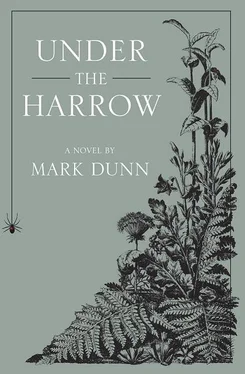However, blessed be those who approached the hospital with more than good intention and dutiful step. Blessed be they who imbibed the brew of optimism and hope — a bitter brew sweetened only in its final swallow, when that which was wished for finally came to pass. Mrs. Pilkins longed to be just such a woman in full, and there were others: loved ones of other sufferers of the dreaded Terror Tremens. Such a cruelty it was to family and friend to see a cherished brother, or son, husband or wife, colleague or chum return to the Dell, only to be snatched away nearly upon that instant and imprisoned, as if the disease were some perpetration of felony to be severely punished. It was tenacious hope that brought Jemima Pilkins one Sunday and one Wednesday of each month to this dark and cheerless building along with her teen-year daughters Charity and Mercy, in the belief that this day would be different from all the others, that upon this day something of the attributes which she drew for her daughters’ very names might imbue and soften the hardened heart of the registrar of visitors, but it was frustration and distemper that staid her departure.
“I mention the hour I spent with my brother four months ago, Mr. Howler,” Mrs. Pilkins rejoined, fixing Howler with an icy glare, “to say that we — all of us — spent time in close company with him, and to-day I stand before you bearing no sign at all of having contracted the disease which removes him from us. Nor do my daughters shew evidence of having caught it, nor anyone else who showered my brother Walter with hugs and kisses on that joyful night turned so tragic by his forced removal from us. I am inclined to conclude that the disease isn’t communicable at all in his case, and for that reason there should be no reason whatsoever for your persistence in keeping us away from him.”
“Then, Mrs. Pilkins, I would advise you to take up the matter with Dr. Towlinson. It is not for me to contravene the rule that Returnees shall have no visitors under any circumstances.”
I could not at that moment keep myself from intruding, and I did so by leaning forward and putting my head between the two sloping shoulders of Charity and Mercy. “Begging your pardon, Mr. Howler,” I began in a deceptively casual lilt, “I’m curious to know (and it amazes me that I have never put this enquiry to you before) if there ever was a Returnee who was permitted a visitation either by family member or friend. Or have they all — without exception — been wholly and permanently quarantined?”
The registrar cleared his throat and then replied, “Certainly there have been exceptions.”
“May I know, then, which of the inmates, who once communed with the Outlanders, have been allowed visits with their loved ones?”
“I haven’t the names at present. But mind, sir, that it must be established that the illness has receded to such point that it won’t spread to others. That is cardinal.”
“And how long does it generally take Dr. Towlinson to establish this fact of recession?”
“I don’t know.” Turning to Sir Dabber: “Would you know? You once served on the board of this hospital. What are the criteria?”
“I wasn’t aware that there were such criteria, Howler. But now that you put it to me, I’d imagine that all devolves to Dr. Towlinson to make that determination, and that it remains a discretionary matter for that gentleman alone.”
The matter now having been placed back into the lap of Mr. Howler, official gatekeeper of Bethlehem Hospital upon Highbury Fields, I said, “Then we should like to see Dr. Towlinson. May we have an interview with him directly?”
Crusty irritation now reconfigured the countenance of my companion. “Trimmers, we didn’t come hither to intercede on behalf of Mrs. Pilkins’ lost cause.” With a bow of apology to that good woman: “Not to cast a single aspersion on the worthiness of your cause.” Then back to me: “We came , in point of fact, to see Bevan, and that is all.”
“Yet it is an issue that confounds me, Sir Dabber,” said I in stubborn pursuit of my newly established mission. “It’s also an issue in which I am now partially invested given the recent departures of my nephew Newman and my only brother Augustus.”
“I had heard about your nephew but was not aware that your brother was gone as well.”
I nodded solemnly and resumed. “Should we all be so fortunate as to witness their return to Dingley Dell, I should like to know if I — and my sister-in-law Charlotte — will ever be permitted to see them subsequent to their sequestration, or must we, as in even the best of cases, wait an interminable number of years for that privilege?”
“The matter is all quite hypothetical at the moment, wouldn’t you say, Trimmers?” returned Dabber with an impatient tap of his umbrella’s ferule upon the hard floor.
“Nonetheless, Mr. Trimmers’ advocacy is much appreciated,” said Mrs. Pilkins, with lips that half-smiled, no doubt, for the first time since she set foot that day within the asylum’s great front hall.
I dropt my voice for a private conference with Sir Dabber. I reminded him that I was doing him a favour by accompanying him on this trip to see his son Bevan, and it was only right and meet that he should reciprocate my kindness by indulging my promotion of Mrs. Pilkins’ four-month-long cause. Had Newman and Gus never left Dingley Dell and the matter remained in the abstract with regard to my own curiosity, I should still at all events wish to find out why it was that none who had left our valley and then returned was ever permitted to see his family, even, in some cases, after many long years of agonising separation. It made no sense — never had. I could not help recalling what Muntle had said to me only two days before: that it was his belief and the belief of the others who gathered with him (for a purpose other than reading poetry) that there was a false reason conveniently put forward for everything that happened in the Dell and then a second true and hidden reason. Was this the case here?
“You cannot see Dr. Towlinson because it’s his afternoon off, and he doesn’t conduct interviews on his afternoon off. It is unheard of,” said Mr. Howler, with finality.
“This is his afternoon off?” asked an elderly farmer, listening with his ear-horn. The farmer’s name I recalled as Matthew or Mark (or Luke or John; the mnemonic I used for this gentleman placed the man somewhere within the ranks of that scribing quartet of gospel apostles).
“That’s what I just said,” snapped Howler with a curved and nearly snarling lip, contemptuously dis-acknowledging the man’s hearing infirmity.
I surmised that, given the way that some in the queue closed about to better hear our exchange, there just might be others amongst those present on this day who were either themselves in straits similar to those endured by members of the Pilkins family or were sympathetic to Mrs. Pilkins’ struggle through sensipathic solidarity.
My supposition was confirmed by the following observations:
“Sometimes I will speak to a person on my afternoon off.” This from Mrs. Jellyby, who supervised the laundresses at Dingley Dell Workhouse #3.
“That isn’t at all germane to the matter at hand,” replied Howler dismissively.
“Where does the good doctor spend his afternoon off? Where is he at this moment?” asked Miss Clickett, Newman’s former village schoolteacher, who had come to visit her sister Minnie who was being briefly interned for a climacteric nervous condition.
“How should I know?” replied Howler, growing more bilious with each moment. “In his study, I would warrant, but don’t hold me to it!”
As a farrier by the name of Stiltstalking was opening his mouth to speak, Howler appended, “But he’s left specific instructions that he isn’t to be disturbed. That is always the way on Wednesday afternoon. Now if you will all kindly—”
Читать дальше












